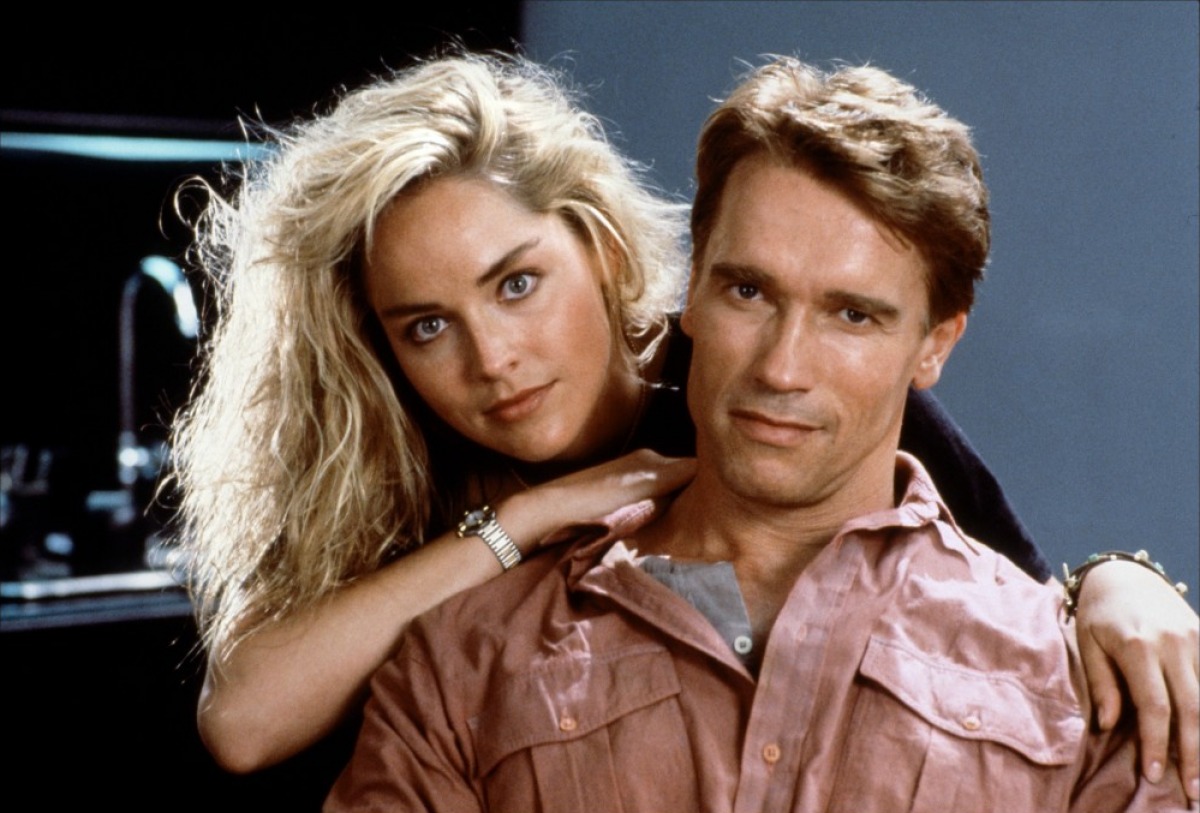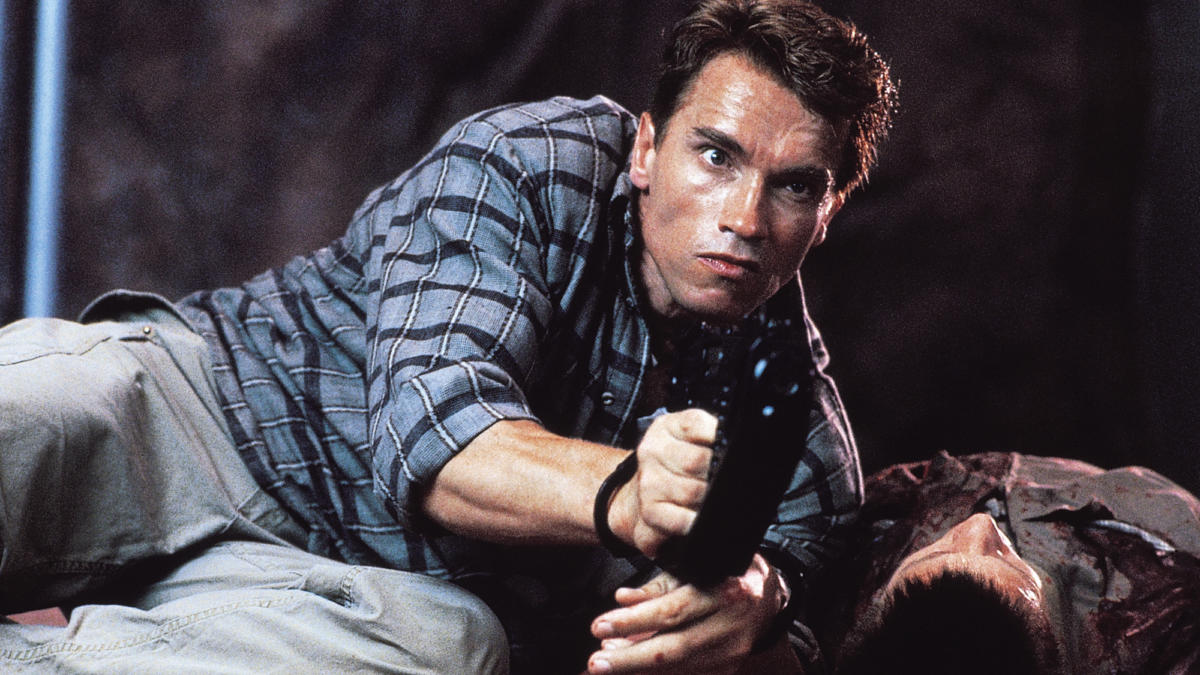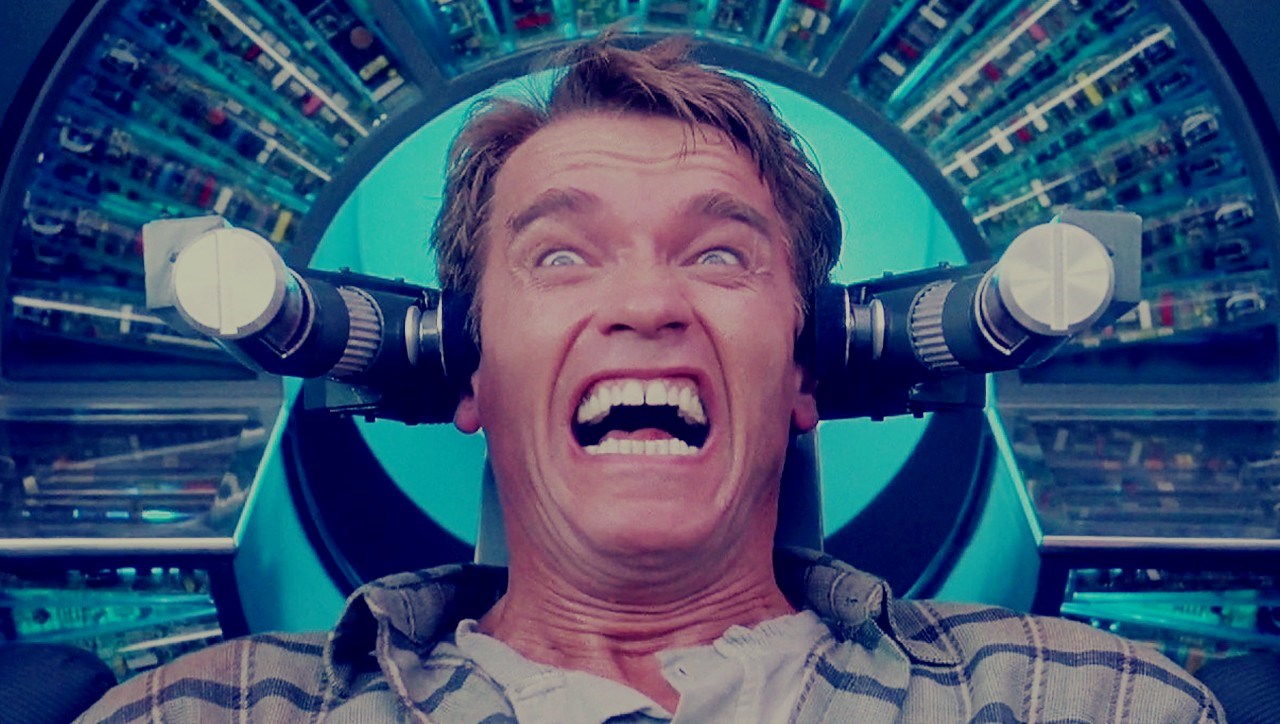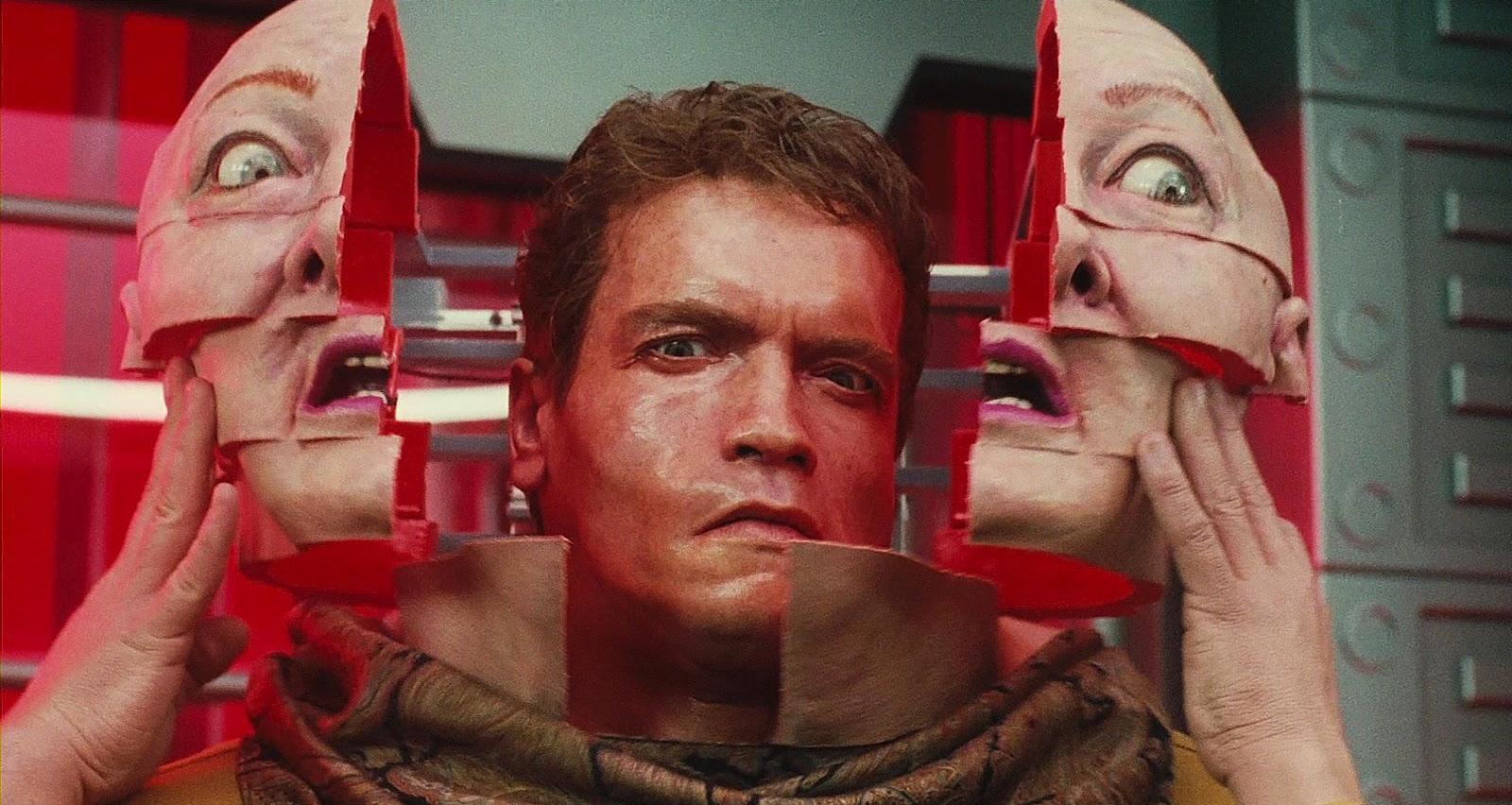USA. 1990.
Crew
Director – Paul Verhoeven, Screenplay – Gary Goldman, Dan O’Bannon & Ronald Shusett, Adaptation – Dan O’Bannon, Ronald Shusett & Jon Povill, Based on the Short Story We Can Remember It For You Wholesale by Philip K. Dick, Producers – Ronald Shusett & Buzz Feitshans, Photography – Jost Vacano, Music – Jerry Goldsmith, Visual Effects – Dreamquest (Supervisor – Eric Brevig) & Industrial Light and Magic, Special Effects Supervisor – Thomas L. Fisher, Makeup Effects – Rob Bottin, Production Design – William Sandell. Production Company – Carolco/Ronald Shusett.
Cast
Arnold Schwarzenegger (Doug Quaid/Hauser), Rachel Ticotin (Melina), Ronny Cox (Cohaagen), Sharon Stone (Lori Quaid), Michael Ironside (Richter), Mel Johnson Jr (Benny), Michael Champion (Helm), Marshall Bell (George/Kuarto)
Plot
Earth in the 22nd Century. Construction worker Doug Quaid goes to Rekall Inc, which advertises that clients can pay to have synthetic memories of a holiday implanted in lieu of actually visiting the place. Quaid chooses an Adventure Scenario where he will be given the memories of a secret agent in action on Mars. Something goes wrong during the implant and Quaid emerges to discover that he really is a secret agent and that his entire life as Quaid is a set of artificial implanted memories. Hunted by assassins, Quaid heads to Mars where he becomes embroiled in a fight with a group of revolutionaries who are planning to overthrow the ruthless dictator Cohaagen.
Amazing special effects and a first rate script – what more could one want from a science-fiction film? The two seen together in conjunction prove to be such rare combinations that it is hard to think of any occasions when together they have not produced a fine science-fiction film. So what then has one got to complain about with Total Recall where both a good script and state of the art effects are to be found in abundance? The problem with Total Recall is more a case of what it could have done without – and these two things could be named as star Arnold Schwarzenegger and director Paul Verhoeven. Total Recall is a case of all the elements of a good science-fiction film primed and ready to go and a crucial mistake having been made in deciding to play the film as completely the wrong type of movie.
Total Recall had a complicated genesis. The idea originated in a short story We Can Remember It For You Wholesale (1966) from science-fiction grandmaster Philip K. Dick. Philip K. Dick was a specialist in a kind of cosmic paranoia. Throughout novels like The Three Stigmata of Palmer Eldritch (1964), Do Androids Dream of Electric Sheep? (1968), Ubik (1969), Flow My Tears, The Policeman Said (1974) and A Scanner Darkly (1977), among numerous others, Dick’s protagonists were constantly finding out that what they perceived to be reality was an illusion or simulation or that they could not be sure that they themselves weren’t artificial constructs and didn’t know it. Philip K. Dick’s work has fuelled a number of other screen adaptations (see below for listing).
We Can Remember It For You Wholesale is a slight story – it rings in at just over 20 pages. The story makes for interesting comparison to the screen version. In the story, the hero Quail (changed to Quaid in the film so as to avoid similarity to then American Vice President Dan Quail) goes to get memory implants of a trip to Mars as a secret agent only to find that he really was a secret agent on Mars and that his memories of such have been buried. Total Recall follows about half of the story, up to about the point that Quail is being pursued by cops who are following him by reading a telepathic tracking device. The film ditches the story’s culmination, which is for Quail to return to Rekal and have them implant a further memory of him saving the Earth from alien invasion, only for the story to go out with the amusing suggestion that he has an additional buried memory of having saved the Earth from alien invasion too.

The Philip K. Dick short story was optioned by Ronald Shusett as long ago as 1974 and Dan O’Bannon worked on before he even wrote Alien (1979). In the mid-1980s, it came into the hands of producer Dino De Laurentiis, the man behind King Kong (1976), Flash Gordon (1980) and Dune (1984). Dino De Laurentiis first attempted to mount a production to be written and directed by David Cronenberg, the cult genre director of Scanners (1981), the De Laurentiis produced The Dead Zone (1983), Dead Ringers (1988) et al, which would have starred Richard Dreyfuss as Quaid. Dan O’Bannon (see below for his genre credits) had already gone through several drafts of the screenplay – most of which foundered on the question of how to come up with a third act for the story. David Cronenberg went through a further thirteen drafts and then gave up in frustration, claiming that he and Dino de Lautentiis were both trying to make entirely different stories.
De Laurentiis then tried to mount Total Recall under director Bruce Beresford, starring Patrick Swayze. Sets were built to start shooting in Australia before the production was abruptly cancelled by the financial collapse of De Laurentiis’s DEG Studios. However, the Bruce Beresford script had been read by Arnold Schwarzenegger, who was then considered the No.1 action star of the 1980s (and ironically had been nixed by De Laurentiis to star in the earlier versions of the film). Schwarzenegger persuaded Carolco, the people behind the Rambo films, Schwarzenegger’s Red Heat (1988) and Terminator 2: Judgment Day (1991), as well as subsequent Paul Verhoeven films like Basic Instinct (1992) and Showgirls (1995), to buy up the script and mount it as a vehicle for him.
It was probably Arnold Schwarzenegger’s involvement that ended up sinking Total Recall. Schwarzenegger’s presence mandated that Total Recall become an action vehicle. Alas, the Philip K. Dick short story is not an action shoot-’em-up type of story at all. Philip K. Dick’s stories are psychological paranoia fantasies – their effect lies in making a reader doubt what they perceive to be the truth (or at least the initial givens that Dick has provided us with). If one wants an idea of the type of film that Total Recall should have been, look at Vincenzo Natali’s coolly intellectual and perfectly Dickian Cypher (2002).
With the directors that Dino De Laurentiis had attached to either version of the film – David Cronenberg and Bruce Beresford – one could have imagined much of the Dickian paranoia remaining intact. With films like Breaker Morant (1980), Tender Mercies (1983), Driving Miss Daisy (1989) and Black Robe (1991), to name but the most famous in a distinguished career, Bruce Beresford has proven a solid dramatist who never lets ego imprimature get in the way of good character-driven storytelling; while David Cronenberg is such an out-there talent in terms of wild genre creativity that his version of Total Recall would have been utterly fascinating – indeed, a strain of Dickian reality bending runs through a number of Cronenberg films like Videodrome (1983), eXistenZ (1999) and Spider (2002). Even the name of Dan O’Bannon, one of the genre’s muchly underrated talents (and his sometimes writing partner Ronald Shusett), on script seemed immensely promising. Dan O’Bannon has an astute grasp of genre sensibilities and writes science-fiction that has a wry, hard-bitten intelligence. (See below for Dan O’Bannon’s other genre credits).

Alas, after Arnold Schwarzenegger came on board, the director recruited to handle Total Recall was Paul Verhoeven, who was then riding on the success of RoboCop (1987). The Dutch-born Paul Verhoeven is an interesting talent, who has had a number of genre associations. In the Netherlands, Verhoeven made films such as Who Is It (1971), based on the memoirs of a prostitute; Turkish Delight (1973), the biopic of an artist; the critically acclaimed war film Soldier of Orange (1977); Spetters (1980) about the lives of dirtbike racers in a nowhere town; and the strange arthouse film The Fourth Man (1983) about precognition.
However, it was with his emergence onto the international stage with the ultra-violent Mediaeval romp Flesh and Blood (1985) and the highly successful RoboCop that Paul Verhoeven gained a name. With these films, Verhoeven’s predilections also became apparent. Paul Verhoeven is a director who aims his impact fairly and squarely at an almost comically excessive overkill of sex and violence. Flesh and Blood managed the balance entertainingly and in RoboCop it came masked in a sharply cynical script where many believed that Verhoeven’s excesses amounted to a satiric take on action movie ultra-violence and neo-fascistic law enforcement. As subsequent Verhoeven films like Basic Instinct (1992), the widely reviled Showgirls (1995), Starship Troopers (1997) and Hollow Man (2000) began to show, these excesses seemed about the only thing in Verhoeven’s arsenal. Most of Paul Verhoeven’s films from Total Recall onwards disappear under a welter of directorial sadism and ham-fisted overkill.
Certainly, the hard-bitten cynicism of screenwriter Dan O’Bannon and the existential paranoia of Philip K. Dick work well in tandem. There is enough of either remaining up on the screen in the finished version of Total Recall for the film, despite its multiple rewrites, to have an adroit cleverness in the story’s reality bendings. Nevertheless, the script is essentially an inner psychological drama and Paul Verhoeven’s thudding action brutalities are badly mismatched to this.
The only level of filmmaking that Paul Verhoeven aspires to is a barrage of comic-bookish splats and Total Recall comes filled with an onslaught of kicks in the crotch, bullets in the head, wrists being severed, and axes and power drills shoved through people. One does not wish in any way to join the anti-screen violence advocates by any means – I just find that Paul Verhoeven’s films have a nastiness. Verhoeven’s films seem to relish an undisguised sadism and sexual humiliation towards his supporting characters and frequently come shot through with a sense of humour that treats such as a black joke. It only seems ugly here every time there is another splurge of machine-gun fire and half the extras on screen are used to redecorate the walls – and to then realize that one is expected to find it a joke. The incorporation of Arnold Schwarzenegger’s trademark one-liners only serve to make it seem even more grotesque. When Total Recall came out, it was slammed by conservative violence in the media watchdog groups for containing a record number of acts of violence on screen. Total Recall is perhaps the only film in the world where the cuts made to allow it to screen on public access tv improve it to no end as a film.

Total Recall is undeniably impressive – the effects offer eye-stretching vistas of reactor caverns drilled into planetary cores, cities stretching across the Martian landscape. There is at least one sequence in a customs queue where a fat lady’s very lifelike face opens up to reveal Arnold Schwarzenegger beneath that holds a moment of breathless awe. There is a smartness to the conception of some of the gadgetry – the secretary who sits electronically changing the colour of her nails (it was her breasts in the original story), Schwarzenegger casually flipping the channel on the view outside the window of his apartment, the automated robotic cabs.
Other times, the science-fiction elements seem comic-bookish and gimmicky – three-breasted mutant whores on Mars, the silly scenes with Arnold Schwarzenegger implanting red glowing bulbs up his nose. People do incredibly dumb things – like shoot bullets in pressurized domes, or simply the daft idea that a pressurized Martian environment would not have automatic doors to come down every time there is a hull breach. The silliest of all are the scenes where depressurisation causes people to become bug-eyed and explode (something that is not possible in the minimal Martian atmospheric pressure differential where sudden depressurisation might at most give one a nosebleed).
The climax is impressive, even dazzling on a conceptual level that science-fiction cinema rarely reaches. At the same time, every inch of the way one’s awe is constantly being undercut by the basic scientific absurdity – such as where Arnold Schwarzenegger activates the planetary reactor and then he and Rachel Ticotin are propelled out into the open Martian atmosphere, their eyes start to swell up and bug out, but their breathing and depressurization problems are instantly solved by an explosion of super-heated (and radioactive) steam!!!! (something that would in actuality probably charbroil the characters) and that within a matter of minutes this somehow also manages to create an atmosphere for the entire planet and conveniently save the expiring rebels.

While the idea of a Total Recall sequel was bandied around for a time, this never emerged. The script for this is reputed to have morphed into Minority Report (2002). The film was later semi-sequelised as the Canadian-made tv series Total Recall 2070 (1999), which, other than taking place in the same implied future, is unrelated. This lasted for 22 episodes, however proved to be a modestly effective and occasionally intelligent Cyberpunk series. Total Recall (2012) is a remake under director Len Wiseman starring Colin Farrell.
Dan O’Bannon’s other genre works are:– Dark Star (1974), Alien (1979), the zombie film Dead & Buried (1981), episodes of the adult animation anthology Heavy Metal (1981), the hi-tech helicopter action film Blue Thunder (1983), Tobe Hooper’s soul-sucking alien vampire film Lifeforce (1985) and the remake of Invaders from Mars (1986), a further Philip K. Dick adaptation Screamers (1995), and the Canadian horror film Hemoglobin/Bleeders (1997). O’Bannon also directed the zombie black comedy Return of the Living Dead (1985) and the H.P. Lovecraft adaptation The Resurrected (1992). Jodorowsky’s Dune (2013) details O’Bannon’s work as special effects director on Alejandro Jodorowsky’s failed adaptation of Dune (1965) in the 1970s.
Other films adapted from the works of Philip K. Dick are:– Blade Runner (1982), the O’Bannon scripted Screamers (1995), Impostor (2002), Minority Report (2002), Paycheck (2003), A Scanner Darkly (2006), Next (2007), The Adjustment Bureau (2011), Radio Free Albemuth (2014), the tv series adaptation of The Man in the High Castle (2015-9) and the tv anthology series Philip K. Dick’s Electric Dreams (2017-8). The Gospel According to Philip K. Dick (2000) is a fascinating documentary about Dick’s bizarre life.
Trailer here


